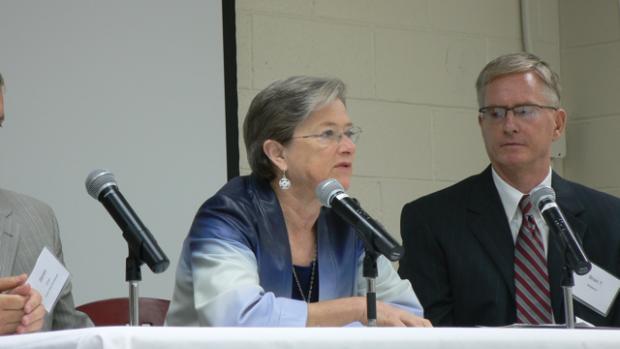Growing a Borderless, Incubator-filled NY Economy

“We empower faculty and students — in our incubators, our classrooms, and our laboratories — to start companies that create jobs and stimulate economic growth,” Polytechnic Institute of NYU President Jerry M. Hutlin said during opening remarks for the Business Incubator Association of New York State, Inc.’s (BIA/NYS) annual meeting Friday, June 11, at NYU-Poly. “Our philosophy of i-squared-e (invention, innovation, and entrepreneurship) is the foundation of our efforts and provides the perfect atmosphere for the topics you’ll be discussing today.”
Participants had gathered to address economic development concerns, mainly how entrepreneurs can better access resources such as talent, technology, research, and capital across New York.
“New York is a very large state, and sometimes local economic development programs are unnecessarily isolated in regional silos,” explained David Hochman, BIA/NYS’ executive director. Selecting NYU-Poly as the venue for BIA’s annual meeting was itself an attempt to help break those silos, said Mr. Hochman. Attendees came from all over New York to NYU-Poly where they met potential business partners based in New York City and shared ideas for business growth.
Many of those attendees were part of a related event the previous day at NYU-Poly, a forum for clean-energy companies the New York State Research and Development Authority (NYSERDA) supports.
Economic Development’s Innovation Era
Bruce Niswander, director of NYU-Poly’s business incubators, led one of the annual meeting’s main events, the panel discussion, “Connecting Companies Statewide with NYC Resources.”
[GALLERY:3471|left]
Brian McMahon, one of the four panelists and president of the New York State Economic Development Council, explained how the very nature of economic development has changed. “Economic development used to be about big projects. Now it’s about innovations, which requires more collaboration and partnerships.”
He pointed to state and city incubators as “microcosms” of what New York is trying to do to facilitate collaborations and partnerships.
Kathryn Wylde, panelist and president and CEO of the non-profit Partnership for New York City, acknowledged that “finally talking to each other à la this [event]” is a good starting point, but that New York needs “public policies that reinforce these conversations.”
She emphasized that the model of regional clusters, a model that’s driven government programs in the past, won’t work for the new realities of doing business in a service- and innovation-based global economy. She advocated for a model that serves industry clusters. “Industry clusters don’t have lines around them,” she said. “They reach across the state.”
So what can be gained by developing a public-private system that feeds resources to borderless, industry clusters?
“Many strong business-incubation programs around the state are eager to bring their highest-potential companies to the attention of investors in New York City,” said Mr. Hochman. “We believe this can be done without causing startups to relocate from the communities where they began. There is plenty of benefit to go around for all communities in the state.”
Clean Energy: A Case in Point
Clean energy, the topic of Thursday’s NYSERDA forum for startup and established clean-energy companies, is an industry cluster benefiting from government support.
“This forum demonstrates New York’s leadership in the critically important field of energy efficiency technologies,” said NYSERDA President and CEO Francis J. Murray. “NYSERDA’s partnerships with these innovative companies will help these companies grow, create jobs, and develop the next generation of technologies to address our energy challenges of the future.”
Micah Kotch, director of operations for NYU-Poly’s clean-energy incubator, New York City Accelerator for a Clean and Renewable Economy (NYC ACRE), one of three NYU-Poly incubators, and one of six such NYSERDA-sponsored incubators in New York, was among the day’s presenters.
According to Mr. Kotch, NYC ACRE is on pace to have 10 on-site and six virtual tenants by the end of this year and its tenants are growing their businesses with new hires, investors, and clients.
Ecological, a company that helps property owners monitor and improve their buildings’ energy usage, is one of several success stories. It has gone from five to 15 employees in one year at NYC ACRE and formed an alliance with Cushman & Wakefield, a commercial real estate firm that manages 70 million square feet of Manhattan space.
NYC ACRE is an example of the new reality of economic development Mr. McMahon described, in which collaboration and partnerships are vital to creating and sustaining innovation-based companies. Its partners include the New York City Economic Development Corporation, the NYC Investment Fund, New York University, Columbia University, and Pratt Institute. Assembling such a group is rare, says Mr. Kotch: “You don’t find that kind of collaboration too often in the city.”
NYU-Poly's New York City Accelerator for a Clean and Renewable Economy
NYU-Poly's NYC ACRE welcomes student and faculty technology endeavors as tenants. Learn more.
Business Incubator Association of New York State, Inc.
The Business Incubator Association of New York State has 35 members of diverse organizational type operating more than 40 business-incubator facilities or virtual programs statewide. bianys.com
New York State Energy Research and Development Authority
Over the past three years, NYSERDA has allocated nearly $30 million to help clean energy and energy efficiency product manufactures and early-stage clean energy companies. nyserda.com




